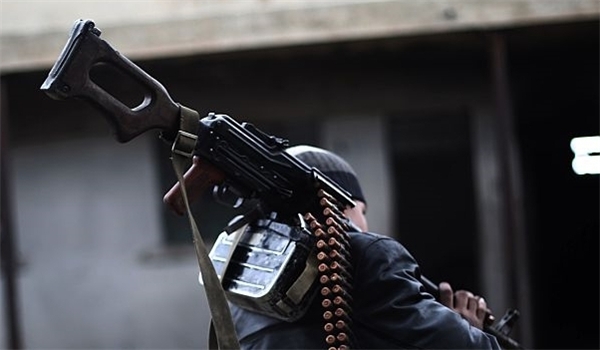Extreme Differences Reported among Ahrar Al-Sham Commanders


Sources close to Ahrar al-Sham disclosed that the status and activities of a number of high-ranking commanders of the terrorist group have been suspended after rising crises resulted from the heavy defeats of the terrorists groups in the war against the Syrian army and its allies.
Taftanaz served as deputy commander of Soqour al-Sham before its merger with Ahrar al-Sham and then was appointed as a commander of the Northern sector of Idlib by al-Masri but he was exempted of this mission and was appointed as deputy commander of the terrorist group.
The replacement came after Jeish Al-Fatah a conglomerate of terrorist groups under the command of the Al-Nusra Front sustained numerous defeats in Aleppo. The backbone of the umbrella group is made of Al-Nusra units, while militants from 12 other terrorist groups, including Ahrar Al-Sham, are all members of Jeish al-Fatah.
Ahrar has been given a political status with its military operations mainly focused in Idlib. The city has now become a shelter of tens of terrorist groups who have all given up fight against the Syrian army in various towns in Damascus, Dara’a and Hom and were relocated to Idlib.

The Syrian army started special operations in Aleppo after several humanitarian pauses declared by Damascus and Moscow to give a chance to the civilian population as well as the militants to leave the Eastern parts of the city through 8 corridors, and managed to take full control of the Northern flank of the Aleppo city’s Eastern districts.
The army units have taken back 20 square kilometers of the total 45 square kilometers of Eastern Aleppo after recapturing several regions, and now, with recapturing the Northern part of Eastern neighborhoods of Aleppo, Syrian army forces have turned their attention to the last half of the East Aleppo pocket.
Meanwhile, terrorist commanders stationed in the Eastern parts of Aleppo have threatened Abdullah Muhammad al-Muhaysini, a senior al Qaeda-linked cleric and the religious leader of Jeish al-Fatah coalition of terrorist groups, that they will be forced to give up fight and surrender the city to the army in the next two days if not rescued from outside.
Local sources in Eastern Aleppo have also reported that the terrorists have lost confidence in their commanders after their repeated unfulfilled promises on breaking the army’s siege and their morale has weakened after heavy defeats and sustaining abundant casualties and damages.
After continued defeats and nearly two months of insistence on remaining in the city and rejecting the army’s several chances to leave Eastern Aleppo with their weapons, terrorists are now facing the realities of war as their comrades’ massive attacks on the city to break the army’s several-month-long siege have all ended up in fiasco.
The Russian Defense Ministry’s Peace Cooperation Center in Syria has said that infighting between terrorist groups in Aleppo has intensified as militants are trying to prevent other comrades from leaving the Syrian city.
Clashes between militant groups have intensified because some militants, who are controlling Eastern Aleppo, wanted to leave the city but were encountered by the most hardline groups,” the center’s statement added.
Also, a sum of 16,000 terrorists had raided the Western and Southwestern districts of Aleppo late October to rescue their entrapped comrades in the Eastern parts of the city.
But, the so-called ‘Great Epic Operation’ and ‘Abu Omar Saraqib’ ended in major defeats even in absence of Russian airstrikes, the militants admitted, blaming their top commander for their “humiliating defeat in Western and Southwestern Aleppo.
“Jeish al-Fatah’s operations failed to meet the coalition’s military objective of lifting the siege on our comrades trapped in the Eastern part of the city,” militants told their affiliated media outlets and on their social media pages late October”.
The militants also complained in their social media posts that Abdullah Muhammad al-Muhaysini, senior al Qaeda-linked cleric and religious leader of Jeish al-Fatah coalition of militant groups, is to blame for the “humiliating result” of the operation in Aleppo.
The terrorists slammed al-Muhaysini for his “totally wrong strategy” for removing the army siege on their fellow militants under siege in Eastern Aleppo, saying that his “naive plans sent hundreds of fighters to meet their death.”
“It seems that al-Muhaysini has sentthe foreign members of the militant groups to the Aleppo battlefield to get rid of them,” several militants wrote in their posts.
The Jeish al-Fatah coalition is on the verge of collapse after its repeated failures in the first and second waves of the Great Epic Operation in Western and Southwestern Aleppo city.
“The recent victories of the Syrian army and popular forces in Southwestern Aleppo and liberation of Housing Project 1070, al-Hikmah School, army’s advances in the neighborhood of al-Rashedeen, the Western flank, government forces’ successful cleansing operation in Zahiyeh al-Assad and Menyan districts and the continued defeats of the terrorists in Jam’iyat al-Zahra district have caused the terrorists to grow hopeless, paralyzed and depressed,” the sources said.
“The terrorists are now accusing each other of betrayal. The accusations find their roots in the escape of several terrorist commanders from battlefields in Western Aleppo and their shooting at each other,” the source added.
According to reports, the terrorist groups lost thousands of their fighters, including tens of top military commanders and a large number of non-Syrian militants, in ‘Great Epic Operation’ and ‘Abu Omar Saraqib’ on Syrian Army positions in Western and Southwestern Aleppo.
Over the recent months, Aleppo has been a battlefield between government forces and numerous terrorist groups.
Syria has been mired in bloody war since March 2011, with Damascus forces loyal to President Bashar al-Assad fighting tens of terrorist groups.







